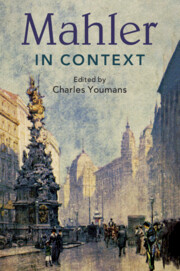Book contents
- Mahler in Context
- Composers in Context
- Mahler in Context
- Copyright page
- Dedication
- Contents
- Figures
- Music Examples
- Notes on Contributors
- Preface and Acknowledgments
- Abbreviations
- Part I Formation
- Part II Performance
- Part III Creation
- Part IV Mind, Body, Spirit
- Part V Influence
- Chapter 27 Posthumous Reputation, 1911 to World War II
- Chapter 28 Mahler and the Second Viennese School
- Chapter 29 The Mahler Revival
- Chapter 30 Broader Musical Influence
- Chapter 31 Adorno
- Chapter 32 Influences in Literature
- Chapter 33 Mahler on Disc
- Chapter 34 Film and Recent Popular Culture
- Further Reading
- Index
Chapter 31 - Adorno
from Part V - Influence
Published online by Cambridge University Press: 18 December 2020
- Mahler in Context
- Composers in Context
- Mahler in Context
- Copyright page
- Dedication
- Contents
- Figures
- Music Examples
- Notes on Contributors
- Preface and Acknowledgments
- Abbreviations
- Part I Formation
- Part II Performance
- Part III Creation
- Part IV Mind, Body, Spirit
- Part V Influence
- Chapter 27 Posthumous Reputation, 1911 to World War II
- Chapter 28 Mahler and the Second Viennese School
- Chapter 29 The Mahler Revival
- Chapter 30 Broader Musical Influence
- Chapter 31 Adorno
- Chapter 32 Influences in Literature
- Chapter 33 Mahler on Disc
- Chapter 34 Film and Recent Popular Culture
- Further Reading
- Index
Summary
Theodor Adorno was the most erudite and most challenging of Mahler’s critical apologists. A deeply cultured thinker whose family background represented a coming together of the twin poles of German rationalism and Italian lyricism, he acquired in his youth a vast knowledge of European classical musical repertoire (mostly by playing piano duets), which he deployed in profound critical readings of a wide range of music. His principal statements on Mahler are surveyed here, from early attempts such as “Mahler Today” (1930) – a concise but wide-ranging essay challenging the prevailing view that Mahler was a late Romantic who had been superseded by the modernist trends of the 1920s – to the monograph Mahler: A Musical Physiognomy (1960) and the centenary address that served as its distillation. A distillation of Adorno’s broader project vis-à-vis late capitalism serves as introduction.
- Type
- Chapter
- Information
- Mahler in Context , pp. 266 - 273Publisher: Cambridge University PressPrint publication year: 2020

